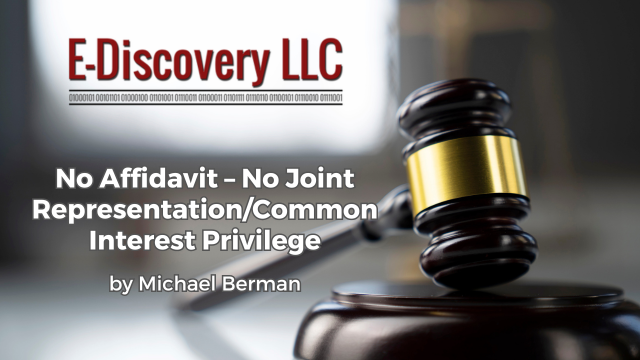
[EDRM Editor’s Note: The opinions and positions are those of Michael Berman.]
The failure to submit a sufficient affidavit of representation doomed an assertion of the joint representation or common interest privilege in Fond Du Lac Band of Lake Superior Chippewa v. Cummins, 2025 WL 2251920 (D. Minn. Aug. 7, 2025).
The Band of Chippewa (the “Band”) sued the Forest Service and others over a land transfer. One defendant and non-parties (collectively the “Cliff Parties”) objected to a U.S. Magistrate Judge’s decision that they must produce documents that they contended were protected by the attorney-client privilege. The District Judge affirmed.
[Magistrate] Judge Brisbois found that the Cliffs parties waived the privilege as to certain communications because those communications included third parties—namely, each other.
Fond Du Lac Band of Lake Superior Chippewa v. Cummins, 2025 WL 2251920 (D. Minn. Aug. 7, 2025).
The court set out the conflicting positions:
- “[Magistrate] Judge Brisbois found that the Cliffs parties waived the privilege as to certain communications because those communications included third parties—namely, each other.”
- “The Cliffs parties contend that under either the joint-representation exception or the common-interest exception, their shared communications remain privileged.”
The court explained that the Magistrate Judge “rejected the Cliffs parties’ attempt to invoke these exceptions on the ground that the privilege log and associated supporting documentation fail to establish the factual predicates necessary for the exceptions to apply. In particular, Judge Brisbois found that the joint-representation exception is inapplicable because the Cliffs parties failed to establish that they were jointly represented.”
The attorney affidavit supporting the privilege claim stated that the attorneys listed on the privilege log were retained by “Northshore, CMSC, or Cleveland Cliffs.” [Emphasis in original]. The court wrote:
On its face, the statement, with its disjunctive “or,” does not claim that all three entities were represented by any or all of the attorneys on the log. Indeed, as Judge Brisbois found, this statement renders unclear which attorneys represented which entities. The Johnson [attorney] declaration therefore fails to establish joint representation.
Fond Du Lac Band of Lake Superior Chippewa v. Cummins, 2025 WL 2251920 (D. Minn. Aug. 7, 2025).
The court said that, even if other evidence pointed to joint representation, the affidavit “muddied the waters enough” to preclude a finding of clear error. In then wrote: “In any event, the other documents to which the Cliffs parties point do not, in fact, unambiguously attest to joint representation.”
In short, the court reasoned:
It would have been a simple enough matter for an attorney to submit an affidavit that clearly stated that the attorney or the attorney’s firm jointly represented Northshore, Cleveland-Cliffs, and CMSC at the time of the communications noted on the privilege log. No attorney did so. For these reasons, Judge Brisbois’s conclusion that the Cliffs parties failed to establish joint representation—and that therefore the joint-representation exception does not apply—is neither clearly erroneous nor contrary to law.
Id.
The court also addressed the holding that the parties did not share a common legal interest.
For another decision focusing on the need for an attorney affidavit to support a specific type of claim of privilege, see Non-Party Law Firm Ordered to Provide Defaulting Client’s Affidavit to Support Claim of Client’s Privilege (Jun. 6, 2025).
Assisted by GAI and LLM Technologies per EDRM GAI and LLM Policy.


